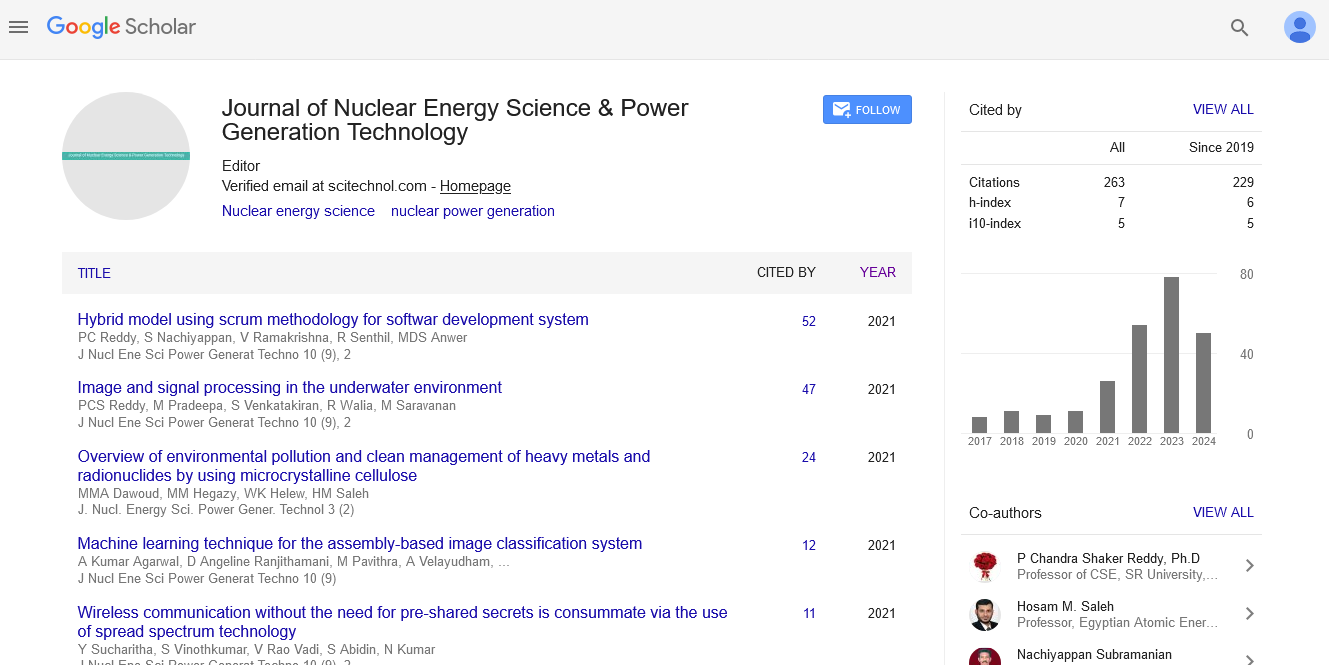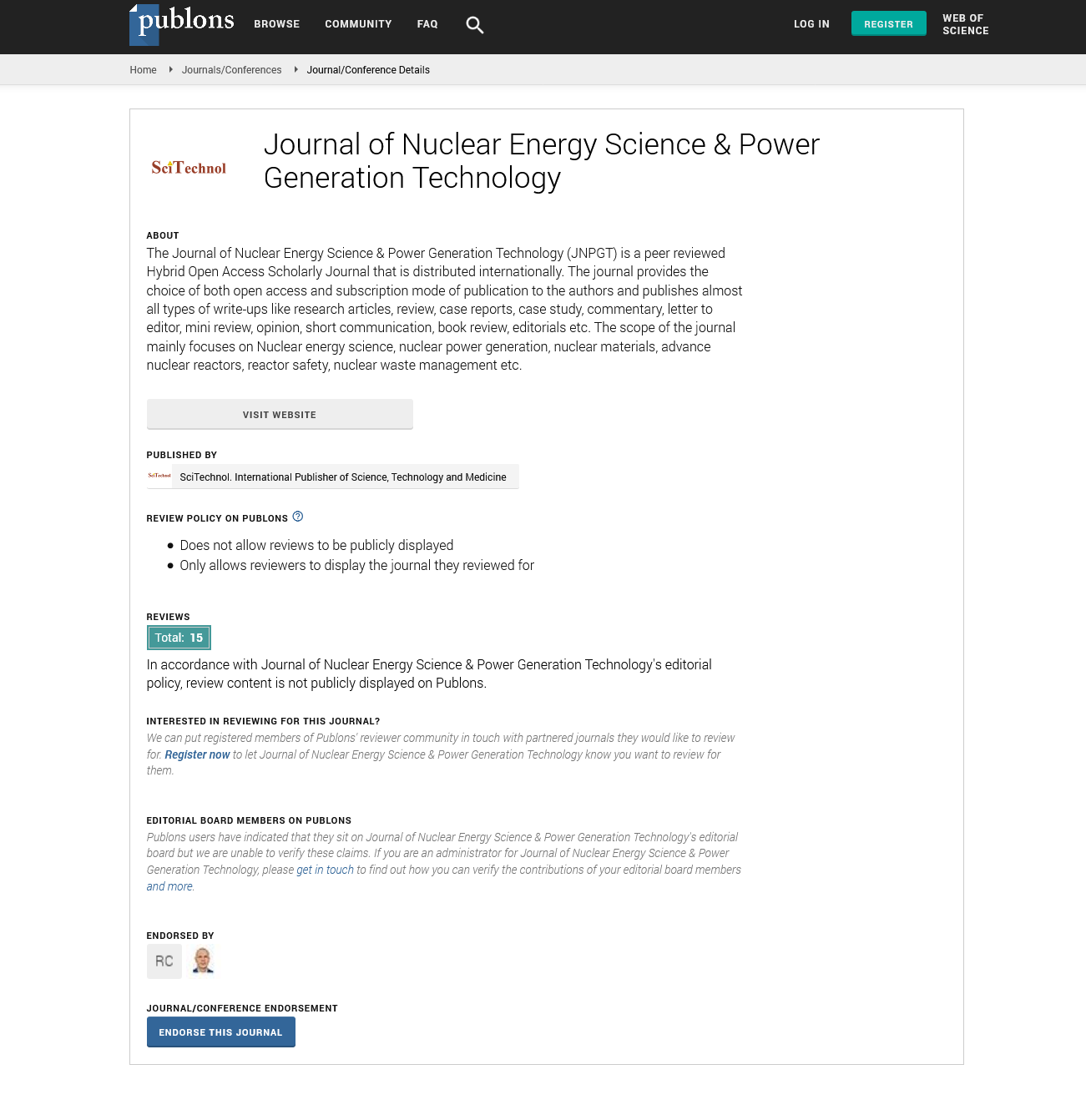Challenges to renewable energy regulation, commercialization and investment in India
Tabrez Ahmad
University of Petroleum & Energy Studies, India
: J Nucl Ene Sci Power Generat Technol
Abstract
One-fifth of the world’s power production presently coming from renewable energy sources and will continue to expand across the developing world and emerging economies. According to the International Energy Agency (IEA), non-OECD countries are predicted to account for 58 per cent of total renewable generation, up from 54 per cent this year in comparison to 2012. Due to the advances in technology, innovations in policy and financing, decreasing prices, and educational efforts make renewables more attractive and affordable for a larger number range of consumers around the world. Renewables may account for almost half of the increase in total electricity generation to 2040, with the use of biofuels. Countries around the world increasingly take measures to research and deploy renewable energy sources to improve energy security, encourage economic growth and respond to environmental challenges particularly associated with climate change. Lack of policies and regulations for the development of renewable energy technologies can hinder adoption of these technologies. Due to the nature of renewable energy structures, renewable energy market needs clear policies and legal procedures to increase the interest of investors. This is because “enabling policies create stable and predictable investment environments, help overcome barriers and ensure predictable project revenue streams. Additionally, regulatory measures such as standards and codes enhance the adoption of renewable energy technologies by minimizing the technological and regulatory risk that comes along with investments in these projects. Despite the many renewable energy policies developed in most of the developing countries, it has been difficult to implement them mainly because they are immature. Additionally, private sector participation in renewable energy projects in India is hindered by the lack of well-defined policies on private investment and delays in the authorization of private sector projects. The 2003 Electricity Act provides for policy formulation by the Government of India and mandates State Electricity Regulatory Commissions (SERCs) to take steps to promote renewable and non-conventional sources of energy within jurisdiction. National Electricity Policy 2005: Aims to exploit feasible potential of renewable energy resources reduce capital costs; promote competition and private sector participation. The percentage for purchase of power from non-conventional sources should be made applicable for the tariffs to be determined by the SERCs. Progressively the share of electricity from nonconventional sources would need to be increased as prescribed by SERCs. Such purchase by distribution companies shall be through competitive bidding process. National Tariff Policy 2006: Formulates that a minimum percentage of renewable energy procurement should be made applicable. Also, a preferential tariff should be determined by SERCs to enable renewable technologies to compete and procurement of renewable energy should be through competitive bidding. The technology, policy and regulatory factors work in tandem to restrict the development and use of renewable energy sources. This paper aims to identify and explain the challenges facing renewable energy technologies adoption, policy implementation, and regulatory mechanism to promote investment.
Biography
Tabrez Ahmad is doctorate in Cyber Law & IPR from AMU Aligarh. He is working as Professor and Dean at University of Petroleum & Energy Studies (UPES) School of Law. Prior to joining UPES he worked as, Director, Alliance School of Law, Bangalore, Professor of Cyber Law at, KIIT University, Mentor at Technology Business Incubator, NSTEDB, Govt. of India and founding faculty at NUJS Kolkata. Dr. Ahmad is a prolific speaker in the areas of Cyberlaw, IPR & Energy Law and has been the resource person at Biju Pattanaik State Police Academy, Orissa State Judicial Academy, SIPARD Tripura, ICCC Egypt, IIPLA Dubai, IIPLA London, BIT’s China, 22nd WMSCI USA, CII, ASSOCHAM, ICLA, CIPAM, ICCC, 6th WIPF, 5th & 11th GIPF, 23rd Convergence India, Meetings International Singapore & Bureau of Police Research Development Govt. of India. He has also practiced for a while at the bar of Delhi High Court and Supreme Court of India. He has authored a pioneering book entitled “Cyber Law, E-commerce and M-commerce”, and published more than 100 papers in reputed journals. He is an active blogger and also on the editorial board of various journals including, JIPR of CSIR, JPL of Canadian Center of Science and Education, Journal of World Review of Business Research Australia etc. As per the New York based Social Science Research Network rankings, he is ranked among the Top 200 Law Authors in the World. He is among the IPLEADERS-2019 Top 100 most followed LinkedIn lawyers and has been ranked at 13th in the world.
E-mail: tabrezahmad7@gmail.com
 Spanish
Spanish  Chinese
Chinese  Russian
Russian  German
German  French
French  Japanese
Japanese  Portuguese
Portuguese  Hindi
Hindi 

